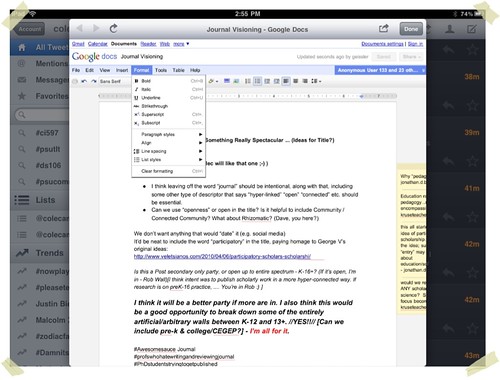A few days ago, there were several of us on Twitter discussing the possibilities for a new open journal. Twitter is often not great for deep conversations, so following the success of the Ning Alternatives document, I thought I would tweet out a public, real-time Google Doc so people could write and share characteristics of a model, open (academic) journal.
The creation of the document moved quickly, and within minutes, we had several pages of information that helped to outline possibilities and partnerships that would help make this open journal a reality. Off the top of my head, collaborators included (I think): Jon Becker, GNA Garcia, Ira Socol, Jeremy Brueck, Tom Fullerton, George Veletsianos, Cole Camplese & Rob Wall (if you were involved, please let me know). Cole actually took a photo from his iPad while he edited from Twitterfic (see below).

But then, all of a sudden, we could no longer access the document. The document now produces the following error:
So, I am writing this for a couple of reasons. First, we want this document back, and I’m hoping that someone at Google Docs will actually respond and help us recover it. There does not seem to be a straightforward way of getting Google’s attention, and thus, no easy way to resolve this problem. Second, I am using this as an example as a possible pitfall of depending on cloud computing. What if this was your dissertation? An important grant proposal? That book you’ve been working on? Or a document with some of your most important memories? While in this case, the issue happened so quickly that we didn’t really get a chance to take alternative measures – I hope this prompts you to keep a back up. The cloud can’t be trusted.
In any case, please forward this message along, and hopefully it gets the attention of a Google engineer that can actually do something about this, or get us some answers.
Thanks!
Update: As of May 4, 2010, the document is now working. Thanks everyone who passed this one. On May 3, the issue reached the Product Manager of Google Docs, and the team attacked the problem almost immediately. I received an apology, status reports, and finally, a detailed report of what had happened and how it had been fixed for the future. Overall, I am very satisfied with response I received from Google.





